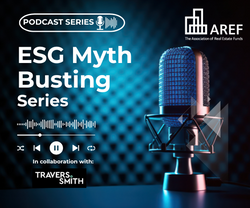The ESG Myth Busting Podcast

Welcome to the ‘The ESG Myth Busting Podcast’, a series of bitesize weekly podcasts that aims to address prevalent misconceptions and myths surrounding ESG, offering clear, evidence-based insights from our industry experts.
Speakers:
- Sarah Walker, Travers Smith (DE& I Taskforce member)
- Sam Carson, CBRE (ESG & II Committee Vice Chair)
- Alice Teboul, Columbia Threadneedle Investments (ESG & II Committee member
Click the title below to view the four podcasts:
Part One: ESG & Sustainability
Our experts address two widely debated myths:
- Myth 1: ESG and sustainability are the same thing – The discussion explores the distinction between ESG as a framework for evaluating financial and operational impacts and sustainability as the practical implementation of environmental and social initiatives.
- Myth 2: "ESG is dead" – The episode examines the ongoing evolution of ESG, the increasing regulatory focus, and why ESG considerations remain integral to investment strategies.
This episode provides clarity on how ESG is defined, its role in real estate valuation, and the importance of distinguishing between ESG risk assessment and sustainability practices.
Listen to the episode here:
Part Two: Net Zero & Value
Welcome to the second episode of The ESG Myth Busting Podcast, where we continue to challenge common misconceptions around ESG. Our speakers explore two widely debated myths related to Net Zero and Value.
Myth 1: "There’s a Green Premium for Net Zero Buildings"
Wouldn’t it be great if Net Zero buildings automatically commanded a green premium? While demand for sustainable buildings is growing, the reality is more complex. A Net Zero building as a concept is still relatively new, and many of the first developments are only now reaching the market. Until these buildings transact in significant volumes, it’s difficult to determine their true impact on value.
Key challenges discussed include:
- The definition of a Net Zero building—does it simply have sustainable features, or does it fully eliminate operational and embodied carbon?
- Limited transaction data—there are few Net Zero buildings available to analyse market trends.
- The role of certifications—could frameworks like the Net Zero Carbon Building Standard or NABERS help bring greater transparency?
Myth 2: "Decarbonisation is an Avoidable Cost"
Some believe that decarbonisation is an optional expense, but our experts argue that it’s an unavoidable investment. With regulatory requirements tightening and Net Zero targets embedded in UK law, action will be necessary—whether now or later.
Why early action matters:
- Delaying could lead to labour shortages and cost inflation as regulatory deadlines approach.
- Lenders are increasingly assessing ESG risks, which could impact financing options.
- Proactive investment in decarbonisation can enhance asset value and future-proof buildings.
Rather than seeing it as a cost, should the industry start viewing decarbonisation as an opportunity?
Listen to the episode here:
Part Three: Biodiversity
Welcome to the third episode of The ESG Myth Busting Podcast, where we continue to challenge common misconceptions around ESG in real estate. This time, Sarah Walker, Alice Teboul and Sam Carson turn their attention to biodiversity—a topic that is often misunderstood but increasingly important in the built environment.
What is Biodiversity & Why Does it Matter?
Before tackling the common myths, our experts start by clarifying what biodiversity actually means in the context of real estate. It is more than just adding green spaces—it is about maintaining and enhancing ecosystems to ensure long-term environmental resilience.
Myth 1: "Biodiversity has little to do with real estate"
Biodiversity is often seen as an issue for rural environments, but the built environment has a direct impact on ecosystems. How can the industry integrate biodiversity considerations into real estate investment and development strategies?
Myth 2: "Biodiversity is just an extra cost"
There is a perception that biodiversity measures are expensive add-ons rather than core business considerations. But could failing to integrate biodiversity into projects actually increase financial and regulatory risks?
Listen to the episode here:
Part Four: Social value
In the final episode of The ESG Myth Busting Podcast, our speakers explore one of the more complex and evolving areas of ESG: social value.
Understanding Social Value in Real Estate
What does social value actually mean in the context of the built environment? How is it different from social impact? And why does this distinction matter to investors, developers, and other stakeholders?
Our experts begin by defining social value as the intentional creation of measurable benefits to society through real estate activity. This could include everything from local job creation and community cohesion to enhancing the environment around a development.
Common Myths Debunked
Myth 1: Social value is just a cost
The discussion highlights why social value should be seen not as a cost but as an investment. Genuine, intentional initiatives can strengthen communities, support local economies, and ultimately improve asset performance—making places more attractive, more resilient, and more valuable.
Myth 2: Social value and social impact are the same
While often used interchangeably, the episode clarifies that social value refers to the measurable inputs and activities intended to benefit society, whereas social impact is about the long-term outcomes of those efforts. The episode also touches on the growing need for consistent frameworks and metrics to assess both.
Through real-world examples and thoughtful discussion, this episode provides a practical overview of how social value can—and should—be embedded in real estate strategies.
Listen to the episode here:
Listen to the complete series here:
Here you listen to the full ESG Myth Busting Podcast Series in one combined episode. We've brought together all four conversations into a single recording, making it easy for you to catch up on the entire series in one go. Whether you're revisiting the discussions or tuning in for the first time, this is a great opportunity to explore the full range of ESG myths—from sustainability and value to biodiversity and social impact—all in one place.
Listen to the complete series here:
Speakers Biographies:

We would like to thank Travis Smith for their collaboration in producing this podcast series. Their expertise and support have been invaluable in bringing these discussions to life.
If any of our members have an idea for a further podcast series, please let us know by emailing: [email protected].




